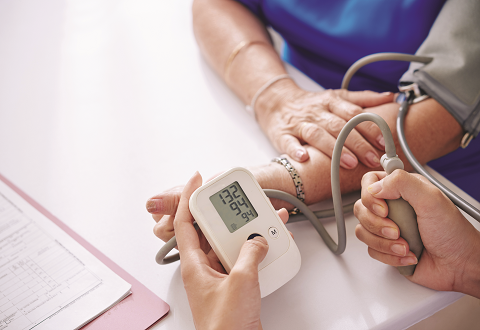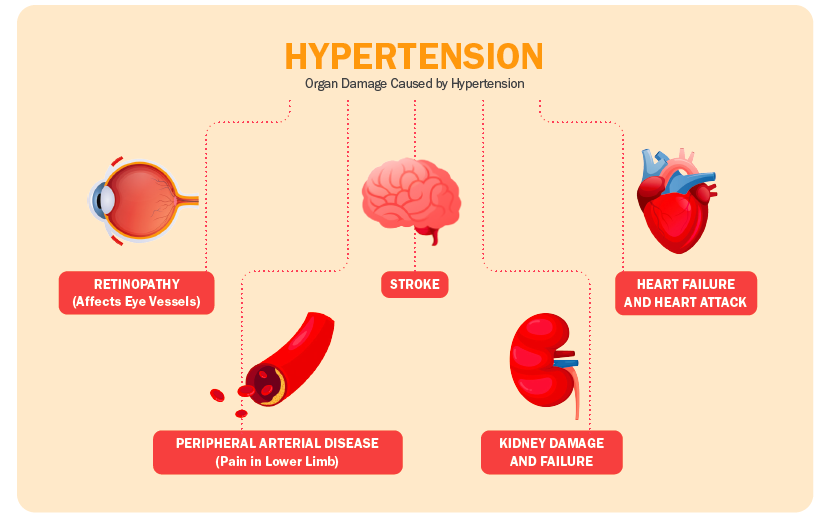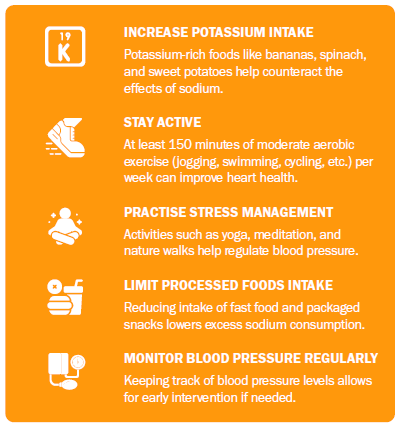
By Dr Shen Xiayan, Consultant, Department of Cardiology
Hypertension is often referred to as a "silent killer" because it typically presents no noticeable symptoms until it causes severe complications such as heart attacks, strokes, or kidney disease. Understanding how this condition develops and affects our bodies is crucial for prevention and early intervention.
Hypertension, or high blood pressure, is a condition where the heart must pump harder for blood to flow through the blood vessels, creating consistently high pressure against the artery walls. Blood pressure is measured using two numbers – the systolic pressure when the heart beats and the diastolic pressure when it rests.
When these readings consistently show 140/90 mmHg or higher, a person is diagnosed with hypertension. Without regular monitoring, many people only discover they have hypertension after it has already affected their health. Over time, this silent condition can damage vital organs, weakening blood vessels, thickening heart wall muscles, and reducing kidney function.

In Singapore, the numbers are concerning. According to the National Population Health Survey 2022, hypertension affects one in three adults (aged 18 to 74 years), with prevalence nearly doubling from 19.8% in 2010 to 37.0% in 2021-2022 among Singapore residents.This rise stems from several key factors – an ageing population, sedentary lifestyles, and dietary habits high in salt and processed foods. Singaporeans of South Asian and Malay descent may have a higher genetic predisposition to hypertension, and urban stressors like long working hours further contribute to the risk.
Understanding Impact and Prevention
The impact on our hearts is significant. When blood pressure remains elevated, the heart must work harder to pump blood, leading to thickening of the heart muscle (left ventricular hypertrophy). This thickening process typically develops gradually over years of uncontrolled hypertension. Over time, this increases the risk of heart failure, where the heart struggles to pump efficiently. The thickened heart muscle requires more oxygen but often receives less blood supply, creating an imbalance that results in further damage to the heart. Moreover, hypertension is a risk factor for the development of coronary artery disease, raising the likelihood of heart attacks.
These complications are dangerous because they can develop quietly over years, leading to sudden life-threatening events. Beyond heart complications, hypertension is a leading cause of stroke because it weakens blood vessels, making them more prone to rupture or blockage. Chronic high blood pressure can also contribute to vascular dementia, as reduced blood flow to the brain over time damages cognitive function. Studies show that individuals with uncontrolled hypertension are at higher risk of memory problems and accelerated cognitive decline.
While poor diet and lack of exercise are well-known factors affecting blood pressure, lesser-known contributors include poor sleep quality, excessive screen time, and environmental noise pollution. Sleep deprivation disrupts the body's ability to regulate stress hormones and blood pressure, increasing cardiovascular risk. Chronic exposure to noise, such as traffic and workplace sounds, has also been linked to higher blood pressure levels. Prolonged stress triggers the release of stress hormones like cortisol and adrenaline, which cause temporary spikes in blood pressure. When stress becomes chronic, these spikes can contribute to long-term hypertension. Practices such as mindfulness, deep breathing, and regular physical activity can help manage stress and maintain stable blood pressure levels.
Many young adults in their 20s and 30s assume hypertension is only a concern for older individuals, but early prevention is key. Monitoring blood pressure regularly, adopting a balanced diet, staying physically active, and avoiding smoking and excessive alcohol can all help reduce long-term risk. Getting adequate sleep daily and managing stress through regular relaxation practices are also essential preventive measures. Establishing healthy habits early can prevent hypertension from developing later in life.
For those looking to manage or lower their blood pressure, adopting the following habits can help:

Hypertension may be silent, but with awareness and proactive management, individuals can significantly lower their risk and maintain healthy heart function.
REFERENCES
1. Ministry of Health Clinical Practice Guidelines: Hypertension. Singapore Medical Journal. 2018 Jan;59(1):17-27. doi: 10.11622/smedj.2018007.
2. Epidemiology & Disease Control Division and Policy, Research & Surveillance Group Ministry of Health and Health Promotion Board, Singapore. National Population Health Survey 2022 (Household Interview and Health Examination). https://isomer-user-content.by.gov.sg/3/28c3b8f9-9216-46be-8fc9-b614098666a9/nphs-2022-survey-report_final.pdf
3. Whelton PK, Carey RM, Aronow WS, Casey DE Jr, Collins KJ, Dennison Himmelfarb C, DePalma SM, Gidding S, Jamerson KA, Jones DW, MacLaughlin EJ, Muntner P, Ovbiagele B, Smith SC Jr, Spencer CC, Stafford RS, Taler SJ, Thomas RJ, Williams KA Sr, Williamson JD, Wright JT Jr. 2017 ACC/AHA/ AAPA/ABC/ACPM/AGS/APhA/ASH/ASPC/NMA/PCNA Guideline for the Prevention, Detection, Evaluation, and Management of High Blood Pressure in Adults: A Report of the American College of Cardiology/American Heart Association Task Force on Clinical Practice Guidelines. Hypertension. 2018 Jun;71(6):e13-e115. doi: 10.1161/HYP.0000000000000065. Epub 2017 Nov 13. Erratum in: Hypertension. 2018 Jun;71(6):e140-e144. doi: 10.1161/HYP.0000000000000076. PMID: 29133356.
4. Mancia G, Kreutz R, Brunström M, Burnier M, Grassi G, Januszewicz A, Muiesan ML, Tsioufis K, Agabiti-Rosei E, Algharably EAE, Azizi M, Benetos A, Borghi C, Hitij JB, Cifkova R, Coca A, Cornelissen V, Cruickshank JK, Cunha PG, Danser AHJ, Pinho RM, Delles C, Dominiczak AF, Dorobantu M, Doumas M, Fernández-Alfonso MS, Halimi JM, Járai Z, Jelaković B, Jordan J, Kuznetsova T, Laurent S, Lovic D, Lurbe E, Mahfoud F, Manolis A, Miglinas M, Narkiewicz K, Niiranen T, Palatini P, Parati G, Pathak A, Persu A, Polonia J, Redon J, Sarafidis P, Schmieder R, Spronck B, Stabouli S, Stergiou G, Taddei S, Thomopoulos C, Tomaszewski M, Van de Borne P, Wanner C, Weber T, Williams B, Zhang ZY, Kjeldsen SE. 2023 ESH Guidelines for the management of arterial hypertension The Task Force for the management of arterial hypertension of the European Society of Hypertension: Endorsed by the International Society of Hypertension (ISH) and the European Renal Association (ERA). J Hypertens. 2023 Dec 1;41(12):1874-2071. doi: 10.1097/HJH.0000000000003480. Epub 2023 Sep 26. Erratum in: J Hypertens. 2024 Jan 1;42(1):194. doi: 10.1097/HJH.0000000000003621. PMID: 37345492.
5. Huang, J, Yang, T, Gulliver, J. et al. Road Traffic Noise and Incidence of Primary Hypertension: A Prospective Analysis in UK Biobank. JACC Adv. 2023 Mar, 2 (2). https://doi.org/10.1016/j. jacadv.2023.100262
6. Nagai M, Hoshide S, Kario K. Sleep duration as a risk factor for cardiovascular disease- a review of the recent literature. Curr Cardiol Rev. 2010 Feb;6(1):54-61. doi: 10.2174/157340310790231635. PMID: 21286279; PMCID: PMC2845795.
This article is from Murmurs Issue 49. Click here to read other articles or issues.
